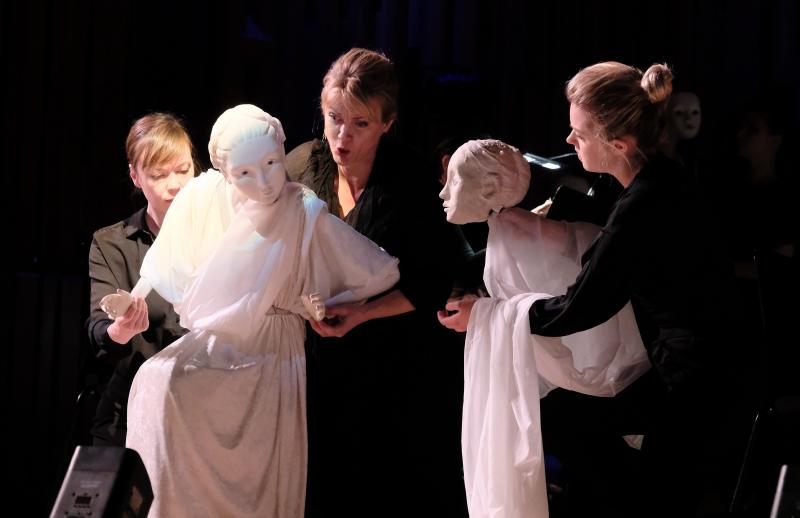 United Kingdom Purcell: Soloists, Choir and Orchestra of the Academy of Ancient Music / Richard Egarr (harpsichord). Barbican Hall, London, 2.10.2018. (CC)
United Kingdom Purcell: Soloists, Choir and Orchestra of the Academy of Ancient Music / Richard Egarr (harpsichord). Barbican Hall, London, 2.10.2018. (CC)

A Funeral for the Queen of Carthage
Purcell – Sonata No. 1 in G mino (mvts 1-3); Orpheus Britannicus: ‘So when the glittering Queen of Night’; Chacony in G minor, Z730; Pavan in G minor; The Tempest: ‘No stars again shall hurt you from above’; Harmonia Sacra: ‘Close thine eyes and sleep secure’, Z184; Chacony in G minor, Z807
Dido and Aeneas (semi-staged)
Dido – Caitlin Hulcup
Aeneas – Ashley Riches
Belinda – Rowan Pierce
Sorceress – Neal Davies
Laura Caldow, Ben Thompson (puppeteers)
Director – Thomas Guthrie
Designer – Ruth Paton
Lighting – Michael Casey
This was a stunning idea: or rather set of ideas. First, the use of puppets to convey characters, a nod to the stylised conventions of Baroque stagework. With an extra pair of hands (the puppeteers in the listing above), both Dido (Caitlin Hulcup) and Aeneas (Ashley Riches) worked their puppets, while, remarkably, also singing their roles. The use of masks, too, was rife, the choir like a Greek chorus. The other major tweak/nudge/wholesale revisioning was to present this whole experience as ‘a funeral for the Queen of Carthage’. A pre-concert discussion had touched on just what to put with Dido in performance. Here, in the first half (so in reverse chronological order) a succession of chamber and vocal works underpinned a staging of what happens after Dido’s death. And so it was that we, the audience, were greeted by Dido’s corpse (an effigy) under a sheet on a plinth as we filed in. The deed is already done; the opera itself is now suddenly one long flashback.
The music accompanying this first part was cast in G minor, the key, of course, of Dido’s Lament. The prevailing sadness was indeed most affecting: at the very opening, four drummers process onto the stage, their hieratic, heavy beat inviting us to a place of mourning. The desolate first piece (Sonata in G minor) found the AAM’s strings sounding decidedly raw and even modern, something even more evident in the slides and slithers of Z807; Rowan Pierce’s pure, fabulous voice illuminated ‘So when the glitt’ring Queen of Night’ like a shaft of silvery moonlight. Overlaid onstage were the emotions and motions of bereavement, from Aeneas’ anger directed at Belinda to numb disbelief. The climax of this first part: the duet ‘Close thine eyes and sleep secure’, unforgettably delivered by Pierce and Ashley Riches. The corpse is scattered with rose petals, a reflection of the final chorus of Dido, whose lines include ‘and scatter roses on her tomb’.
Originally, the Dido was to have been Christine Rice. Her replacement, Caitlin Hulcup, managed not only to give a creditable account of the role but also managed to project her emotions via her voice and the puppet. The puppets were dressed in white (Roman togas?) almost as if to give them a Stravinskian distance (one thinks of the chorus in Oedipus Rex, for example, or the ‘white’ music of Orpheus). The chorus was deployed around the stage, a vital part of the action, chameleon in their roles, whether lusty sailors or lachrymose in the miraculously balanced ‘Great minds against themselves conspire’. But their greatest moment was that final chorus, its silences speaking just as much as those perfectly modulated, blanched gestures.
Hulcup’s assumption of the role was direct and eloquent, a strategy that climaxed in a tremendously powerful ‘Thy hand, Belinda’ that leads to her final, great, moment. The Lament itself was notable for the eviscerated strings, the descending bass for the ground, exposed at the opening, raw like a bleeding wound. The high point here was, rather than Dido’s cries of ‘Remember me,’ the closing chorus (‘With drooping wings ye cupids come’), an unforgettable close, unforgettably given by the Choir of AAM.
It was wonderful to see Rowan Pierce as Belinda, her ‘Shake the cloud from off your brow’, which opens the opera vocally, fresh of rhythm and entirely within the part tight from the off. Again, that purity of voice was married with an accuracy that is a constant source of delight. Aeneas gets much less to do in this piece than his titular billing might imply. Nevertheless, Ashley Riches brought his full, mellow voice to bear effectively, inviting us to see him as a powerful presence.
The ‘Sorceress’ was taken by a male, Neal Davies, reflecting documentary evidence that a male took the part in an early performance of the piece. Davies relished every malicious movement without, thankfully, descending into too much caricature, as well as enunciating every word brilliantly; the chorus, in their masks, took on, perhaps, the roles of demons.
The AAM’s haunting sound was the thread that held the evening together, while the strings’ evocation of hunting horns was one of the most viscerally surprising moments of the evening. The continuo group was Egarr’s enthusiastic harpsichord (a huge sound when needed), two theorbos and two guitars, the latter’s vamp-till-ready chaconne a moment of magic. Egarr himself, placed openly on stage with his continuo group, was very much part of the action, even mobile around the stage at one point
Whatever the orchestral vigour of moments like the Sailors’ Dance, it was that rawness of both sound and emotion that remained so strongly after the final chord had struck. Dido is as emotionally significant today as it was centuries ago. A remarkable evening.
Colin Clarke
